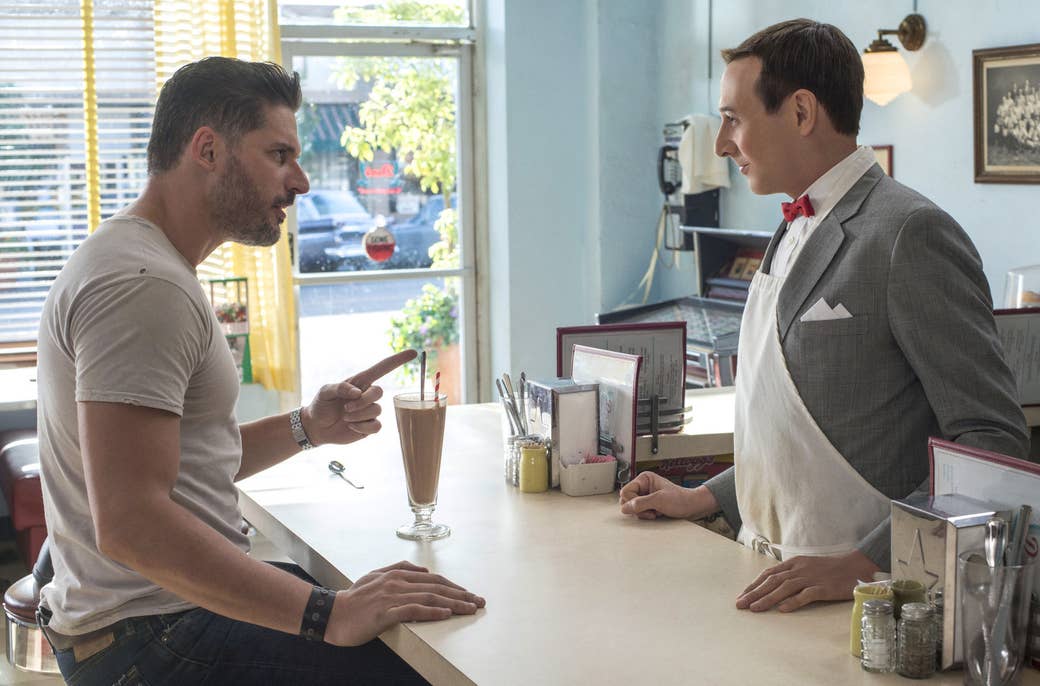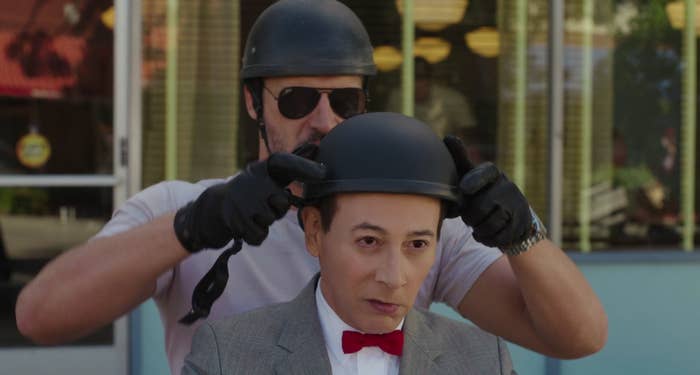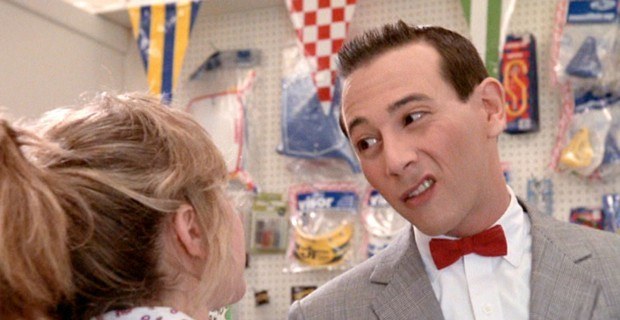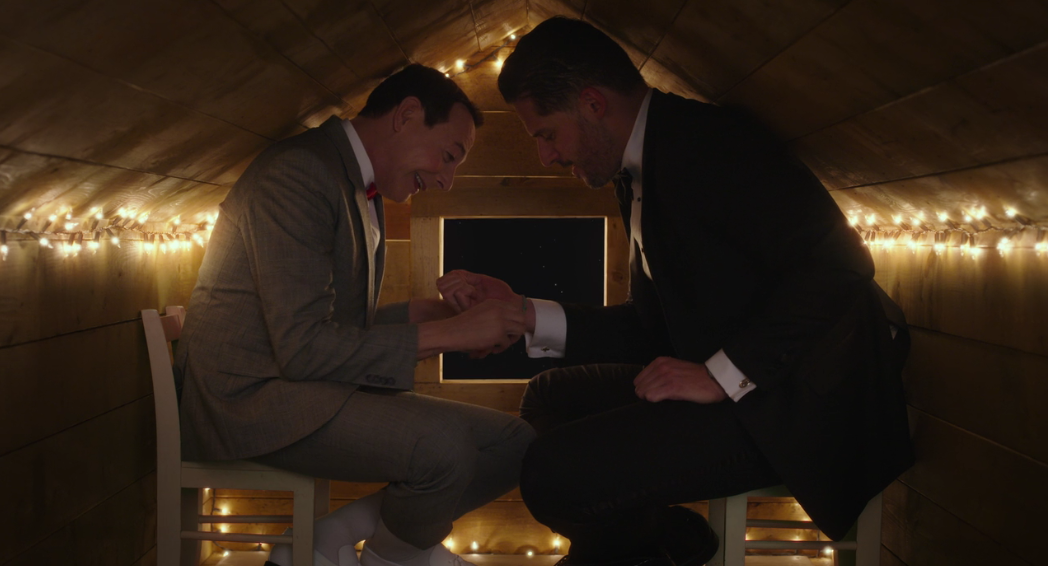
Before the credits roll in Pee-wee’s Big Holiday, Pee-wee Herman and Joe Manganiello are riding off into the sunset together.
The new Netflix movie, Pee-wee’s first in nearly three decades, takes the Paul Reubens character on a cross-country journey to reconnect with the hunky Magic Mike actor (Manganiello plays a fictionalized version of himself). Because if Pee-wee’s Big Adventure is actually a love story about Pee-wee and his bike, Big Holiday is a love story about Pee-wee and Joe.
From the moment Pee-wee and Joe meet, the two form an instant bond. (In this universe, Joe shares Pee-wee’s youthful exuberance and isn’t married to Sofia Vergara.) As Pee-wee treks his way to Joe’s birthday party in New York City, he dreams of their eventual reunion. At one point, he imagines them jousting, which is probably the closest Pee-wee has ever gotten to a sex dream. And when Pee-wee is held up in typical Pee-wee fashion, Joe spends his party sulking, fixated solely on the one person he wanted to be there.

Once the two are finally brought together again, Joe forgoes the festivities to take Pee-wee to the roof, where they sit together so closely in a treehouse that a kiss seems nearly inevitable — even though it never happens.
It would be easy, albeit woefully naïve, to dismiss the relationship between Pee-wee and Joe as a “bromance.” The homoerotic subtext is too readily apparent to be accidental, not to mention that Pee-wee is the polar opposite of a “bro.” And categorizing Pee-wee and Joe as “just friends” would be, at best, a euphemistic solution to a relationship that’s deliberately vague but undeniably queer. Because Pee-wee is almost entirely sexless, his age indeterminate but his interests decidedly childlike, he can never consummate anything. Instead, he and Joe share the kind of mutual crush that passes for grade-school intimacy.
No, Pee-wee and Joe don’t fuck, but they do exchange friendship bracelets.
Pee-wee has always been something of a queer character, but speculation about his sexual identity is fraught. Still, the character has long trafficked in subtext, due in part to his raunchier origins. Reubens created Pee-wee out of his work with the Groundlings, an improv team with a decidedly more adult sensibility. Pee-wee has never come out, but his coded queerness is, at the very least, a winking nod at an older, more perceptive audience.

When Pee-wee — who got his own series in the late ‘80s, Pee-wee’s Playhouse — made his movie debut in 1985 with Pee-wee’s Big Adventure, he flirted with romantic entanglements with the opposite sex, without really flirting at all. With Dottie (Elizabeth Daily), the lovelorn bike shop employee devoted to him, Pee-wee is a bratty kid, repulsed by the idea of any real affection between them. “There’s a lot of things about me you don’t know anything about, Dottie,” he tells her. “Things you wouldn’t understand. Things you shouldn’t understand.” And while his dalliance with a waitress named Simone (Diane Salinger) is slightly more mature, or at least suggestive enough to arouse the suspicions of Simone’s boyfriend Andy (Jon Harris), Pee-wee doesn’t actually offer Simone anything more than a kind ear and some words of encouragement. (In 1988’s Big Top Pee-wee, Pee-wee is engaged to Penelope Ann Miller’s Winnie and falls for trapeze artist Gina Piccolapupula, played by Valeria Golino. But the less said about Big Top Pee-wee, the better.)
More than 30 years later, in Pee-wee’s Big Holiday, Pee-wee has another girl making eyes at him, Emily (Katherine VanderLinden), and he shares a brief kiss with Alia Shawkat’s ‘60s exploitation-style outlaw, also named Pee-wee. But the real romance at the heart of Big Holiday is between Pee-wee and Joe, in all his six-packed glory.
Their love isn’t explicit, however, because while the world has moved forward, Pee-wee himself has not: At 63, Reubens imbues his character with the same wide-eyed innocence and preadolescent mannerisms he has always had. Pee-wee and Joe kissing would feel unnatural not because it’s two men, but because one of those “men” is Pee-wee. Even Joe, with his well-developed grown-up muscles, is basically a kid in Pee-wee’s world.

However open-ended it might seem, Pee-wee’s Big Holiday truly is a queer love story. The subtlety of Pee-wee and Joe's romance is not repressive so much as subversive. The use of queer themes in what’s largely a kids movie introduces young audiences to the idea of bucking societal trends in a playful but powerful way. Pee-wee, who narrowly avoids a shotgun wedding in Big Holiday, is a reminder that you don’t have to meet heterocentric expectations: You can ride off on a motorcycle with your arms around Joe Manganiello. (Or, in the case of a 1987 episode of Pee-wee’s Playhouse, you can marry fruit salad.) It’s the kind of queerness that older, straighter audience members could conceivably miss, because it’s not for them. Instead, it embraces the kids who are different, and the grown-up queer viewers who, from a young age, were drawn to Pee-wee’s persistent rejection of the norm.
Big Holiday is the natural progression for a character who, consciously or otherwise, has long served as a point of identification for queer audiences. It’s the closest Pee-wee will likely ever get to a gay happily ever after, and for all that the movie holds back, it’s remarkably satisfying. For anyone who ever felt welcomed by the Playhouse — and for young people who can’t yet articulate that need — Big Holiday is more than just ‘90s nostalgia. It’s the kind of love story that still desperately needs to be told.
